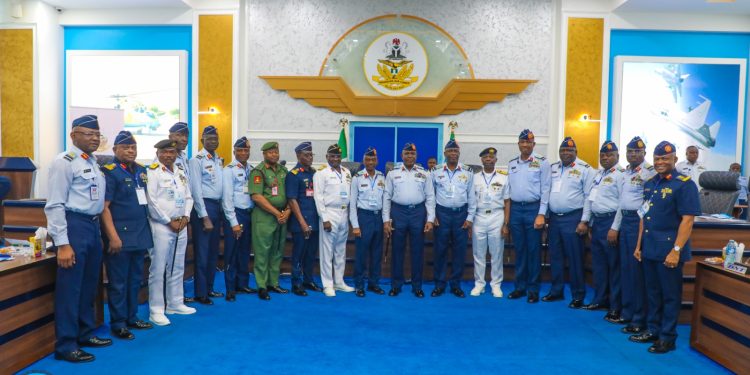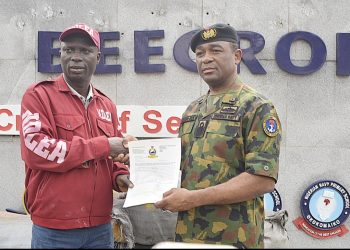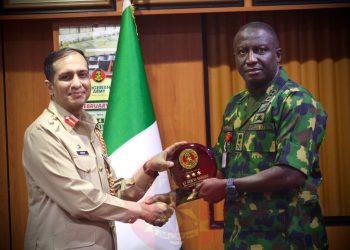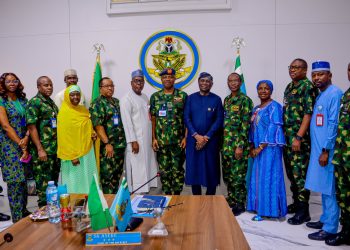By Nkechi Eze
The Nigerian Air Force (NAF) on Thursday hosted the third quarter Defence Headquarters and Services Transformation and Innovation Seminar in Abuja, with top military leaders and stakeholders brainstorming on strategies to strengthen the will to fight, which has been identified as a critical factor in Nigeria’s ongoing operations against terrorism, insurgency, banditry, and other violent crimes.
Declaring the seminar open, the Chief of the Air Staff (CAS), Air Marshal Hassan Abubakar, said the event marked “yet another milestone in our concerted effort to propound innovative strategies for transforming the inherent capabilities of the Armed Forces of Nigeria for enhanced military effectiveness.” He stressed that NAF personnel, alongside their counterparts in the Army and Navy, are deployed across the six geopolitical zones in joint and interagency operations, helping to restore peace, law, and order in troubled areas of the country.
“Our commitment to defend the territorial integrity of the country and ensure security of lives and property remains firm,” the CAS declared. “It is therefore necessary to sustain the tempo, ability, and will of our personnel to fight, even as government continues to provide modern equipment and other resources to prosecute the war against terrorism, insurgency, banditry, and other violent crimes across the country.”
While acknowledging the role of technology and welfare, Air Marshal Abubakar emphasized that intangible assets such as unity, loyalty, doggedness, and morale must never be allowed to deteriorate. “The best technology could be deployed and welfare services improved, but the will to fight the adversary must be guarded at all costs from being degraded,” he warned.
The CAS described first-class training as the best form of preparation for battle, stressing that training strengthens resilience and determination in combat. He explained that the theme of the seminar, “Galvanizing the Will to Fight: Issues and Transformative Solutions for the Armed Forces of Nigeria,” was carefully chosen because of its relevance to contemporary security challenges.
“The will to fight is a complex and critical factor that often determines success or failure,” he said. “It encompasses psychological resilience, physical capability, ideological conviction, and motivation to make sacrifices. It also goes beyond access to weapons and technology, embracing loyalty, trust, and excellence. Our base is strongly influenced by effective jointness, trust in leadership, logistic support, and psychological stability, among other elements.”
The CAS commended the Armed Forces for consolidating troop morale despite daunting and multifaceted challenges, but warned that the adaptive strategies of violent non-state actors could erode gains if morale is not continuously strengthened. He expressed confidence that the presentations and interactive sessions would generate sustainable strategies to bolster troop resilience nationwide.
Highlighting recent transformation efforts, Abubakar revealed that the NAF has reviewed its operations to enhance synergy with other Services and updated its equipment for joint operations, while integrating measures to mitigate civilian harm. Training programmes, he noted, have been expanded to build both individual and collective capacity, with emphasis on innovative problem-solving in sustaining fleet equipment and logistics.
In a major development, he announced the resuscitation of the Nigeria Air Force Surveillance Aircraft Project, which had been suspended for seven years. The light motor utility eight-seater aircraft, he explained, would strategically enhance self-reliance in aerospace technology while advancing indigenous innovation in the aviation sector.
The CAS also highlighted welfare-focused initiatives such as the construction of new accommodation blocks that reduced NAF’s housing deficit by 40 percent, the introduction of a group personnel access insurance policy, and the construction, upgrading, or remodelling of hospitals and medical centres nationwide. He noted that all personnel had recently been issued complete new sets of uniforms as part of morale-boosting measures.
“From lessons learnt in all operations, and from military history, we know that morale plays a significant role in strengthening the will to fight, particularly in volatile, complex, and uncertain environments,” he observed. “It is imperative that we vigorously pursue transformative and innovative strategies to mitigate challenges affecting our troops’ resilience and fighting spirit.”
Earlier in his welcome address, the Chief of Transformation and Innovation, NAF Headquarters, Air Vice Marshal A.H. Amesinlola, expressed delight at hosting the seminar and warmly welcomed the CAS, senior officers from Defence and the Services, experienced resource persons, and participants both physical and virtual. He explained that the quarterly seminar, rotated among the Services and Defence Headquarters, had become a critical platform for developing transformative solutions to contemporary challenges.
“Today’s event signifies yet another landmark effort to proffer transformative solutions to some of the daunting issues confronting us,” AVM Amesinlola said. “Over the years, our gallant officers, soldiers, ratings, airmen and airwomen have made significant progress in our operations on all fronts. There is no doubt that dedication to duty and the will to fight in the face of adversity have significantly contributed to this. The will of armed forces to fight and sustain higher tempo than the enemy is a crucial factor in warfare.”
He warned, however, that recent developments involving violent non-state actors and enemies of the state had intensified attempts to erode troop morale, a situation that, if unchecked, could lead to reversals of hard-won gains in some theatres of operation. He urged continuous scanning for vulnerabilities that could demoralize personnel, stressing that the seminar theme resonated directly with the Chief of Defence Staff’s leadership concepts and the CAS’s command philosophy, especially the pillars of deliberate training, mission-oriented force development, and sustaining a highly motivated force through welfare and infrastructure renewal.
Amesinlola also highlighted how the CAS’s support had transformed the working environment of the NAF Transformation and Innovation Branch, noting the relocation to a new annex at Goodwin with tastefully furnished and well-equipped offices. “This transformation in our work environment is indeed remarkable and well appreciated. It is just one of the many giant transformation strides of the Chief of the Air Staff to motivate personnel for improved productivity,” he said.
On the innovation front, he revealed that several research and development projects had been approved under the CAS’s directive, including initiatives at the Air Force Institute of Technology and various operational units such as loading trolleys for Alpha Jets, voting regulator adjustments, electronic buses, fire pump test stands, and damage trigger systems. He added that funding had been secured for promising energy projects, including anti-drone technology development.
Concluding his remarks, AVM Amesinlola thanked the CAS for his determination and huge investments in transformation and innovation, while also appreciating participants and resource persons for their commitment to enriching the seminar.
The 3rd Quarter 2025 Defence Headquarters and Services Transformation and Innovation Seminar, hosted by the Nigerian Air Force, brought together senior officers, defence experts, and stakeholders to deliberate on strengthening the will to fight as the Armed Forces of Nigeria continues to confront evolving security threats across the nation.

















